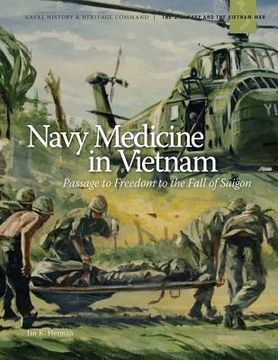Reseña del libro "Navy Medicine in Vietnam (Black and White) (en Inglés)"
In July 1953, U.S. and North Korean military officials signed an armistice at Panmunjom ending hostilities-but without a permanent peace on the Korean peninsula. Demobilization of the armed forces began almost immediately, following much the same pattern shortly after World War II. This military decrease was across the board and keenly felt by the Navy Medical Department.The authorized ratio of medical officers to active duty troop strength was cut in half. Between 1953 And 1954, the Navy lost more than 1,000 physicians-an astonishing 25 percent reduction. For the fleet, reductions meant that battleships went from two medical officers to one; aircraft carriers, from three medical officers to two; and LST (landing ship tank) squadrons, from two physicians to one. Besides personnel cuts, peacetime also meant disestablishing many naval hospitals or, at the very least, downgrading them from hospitals to infirmaries.Despite this retrograde movement in Navy medical personnel and facilities, the Cold War continued. Indochina replaced Korea as the number one hot spot. When French colonial rule in Indochina came to a chaotic end in 1954, following the climactic defeat at Dien Bien Phu, the U.S. Navy helped evacuate 721 French troops and transport them back to their homes in France and North Africa. These pitiful soldiers suffered not only from wounds but also from a variety of jungle diseases and malnutrition. The hospital ship Haven (AH 12), which had already seen action in World War II and four tours during the Korean War, was again pressed into service for the trip. When one of the Legionnaires died en route, "they off -loaded the body in a casket with the French flag draped over it," Navy nurse Anna Corcoran recalled. "That was very, very emotional to watch. Of course, at that time, we didn't know how many of our own would be going home that way from Vietnam. We couldn't have imagined back in 1954 that 10 years later we would be involved just like the French were."

